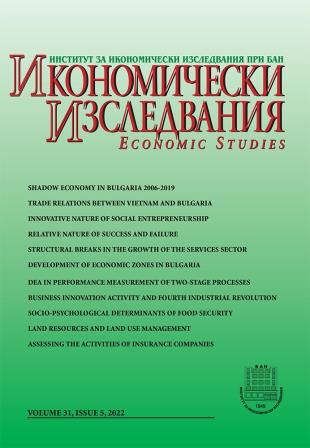Innovative Nature of Social Entrepreneurship at the Present Stage
Innovative Nature of Social Entrepreneurship at the Present Stage
Author(s): Halyna V. Kaplenko, Inna M. Kulish, Andrii V. Stasyshyn, Volodymyr Ya. Burak, Svitlana M. SynchukSubject(s): Economy, Business Economy / Management, Socio-Economic Research
Published by: Институт за икономически изследвания при Българска академия на науките
Keywords: social entrepreneurship; humanism; innovation; social values; environment; people with special needs
Summary/Abstract: The paper reveals that social entrepreneurship as a type of activity aimed at solving certain problems of society, first emerged in the former Soviet Union in the form of enterprises in the society of the blind; and, accordingly, in Ukraine, which at that time was part of the Soviet Union. These events took place more than fifty years earlier than in the United Kingdom, which is now considered the founding father of social enterprises. The conditions in which the first social enterprises were created and functioned, the influence of public administration and regulations on this process are shown, and it is shown how social enterprises created on the basis of humanism became an instrument of coercion by the state and thus lost their essence. The example of Costa Rica (first place in the world in the Happy Planet Index) and Norway (second place in the world in terms of Prosperity) shows that methods of supporting social entrepreneurship can range from full-fledged institutional support at all levels to almost complete lack of influence and control by the state. The existing classifications, features and concepts of social enterprises were analysed, mistakes made in the past were taken into account, and in particular, the need for non-discrimination was emphasised. And on this basis, the authors proposed to identify four features that are mandatory and relevant to each social enterprise. It is emphasised that none of the components of the “Triple Bottom Line” can be defined as the most important because they are all equally important. It is shown that a social enterprise is not identical to a charitable organisation. It has been established that a classic enterprise may have the characteristics of a social enterprise, but a social enterprise obligatory must have these characteristics in order to fulfil its mission. It has been shown that the same organisations can be sources of funding or social entrepreneurs, depending on what services it provides in specific conditions. The instruments of state support of social entrepreneurship in Ukraine are considered and it is shown that they are insufficient. The labour market and the number of people with disabilities in Ukraine are analysed, the existence of problems with the employment of people with special needs is shown and the need to strengthen state aegis and provision of regulatory and legal support for social entrepreneurship in Ukraine is emphasised. The obtained results are planned to be used in further research, which will relate to the opportunities for social entrepreneurship in the field of environmental services.
Journal: Икономически изследвания
- Issue Year: 2022
- Issue No: 5
- Page Range: 33-45
- Page Count: 13
- Language: English

